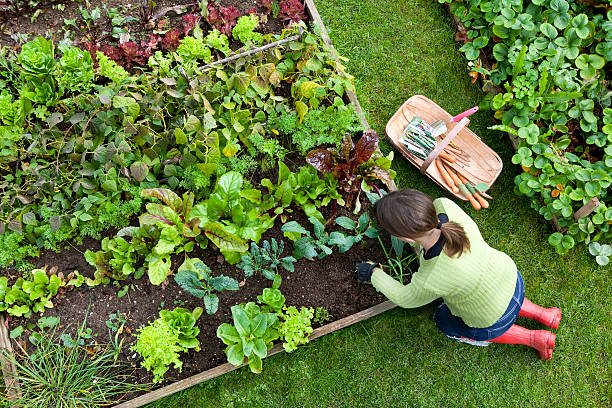
If you’re anything like me, then you love the idea of gardening, but the process always seems so daunting. I have a black thumb, as they say, and every plant I’ve ever tried to grow has died a slow and painful death. But earlier this year, I decided to give it another go. I started small, with a few herbs in pots on my balcony, and then gradually moved on to starting a small vegetable garden in my backyard. And you know what? I’ve actually been successful! If you’re interested in starting your own backyard garden, read on for some tips on how to get started. Trust me, it’s not as difficult as you think.
Table of contents
-
-
- Why You Should Grow A Vegetable Or Herb Garden
- The Benefits of Growing Your Own Food
- How to Get Started Growing a Garden
- The Best Vegetables and Herbs to Grow in Your Garden
- How to Care for Your Garden
- Conclusion
-
Why You Should Grow A Vegetable Or Herb Garden
One of the most rewarding things you can do is grow your own food. Not only is it satisfying to be able to step outside and pick fresh produce from your own backyard, but you also know exactly how it was grown and what went into it. Growing a vegetable or herb garden is a great way to get started with gardening, and it doesn’t have to be difficult or time-consuming. Here are a few reasons why you should grow a vegetable or herb garden:
1. Fresh produce tastes better than store-bought.
2. You know exactly what went into growing your food, so you can be sure that it’s organic and free of harmful chemicals.
3. Gardening is a relaxing and therapeutic activity that can reduce stress levels.
4. Growing your own food is more economical than buying groceries all the time.
5. You’ll have a never-ending supply of fresh herbs and veggies if you grow them yourself!
If you’re thinking about starting a garden, we encourage you to give it a try. It’s a fun and rewarding experience that everyone should enjoy at least once in their lifetime.
The Benefits of Growing Your Own Food
There are many benefits to growing your own food, including:
1. Save money on groceries: Growing your own fruits and vegetables can save you money on your grocery bill.
2. Eat healthily: Homegrown fruits and vegetables are often fresher and healthier than those bought at the store.
3. Know what’s in your food: When you grow your own food, you know exactly what has gone into it – no hidden pesticides or other chemicals.
4. Get outside and get active: Gardening is a great way to get some exercise and enjoy the outdoors.
5. Relaxation and stress relief: Gardening can be a very calming and therapeutic activity.
How to Get Started Growing a Garden
If you’re thinking of starting a vegetable or herb garden, there are a few things you need to do to get started. First, you need to choose a spot in your yard that gets plenty of sunlight. Vegetables and herbs need at least six hours of sunlight a day to grow properly. Once you’ve found the perfect spot, you need to prepare the soil. You can do this by tilling the soil or adding compost to it. This will help your plants grow healthy and strong.
After your soil is ready, it’s time to start planting! You can either buy seedlings from a nursery or start seeds indoors and then transplant them outdoors later on. Once your plants are in the ground, make sure to water them regularly and give them plenty of sunshine. With a little love and care, you’ll soon have a beautiful vegetable or herb garden that you can enjoy all season long!
The Best Vegetables and Herbs to Grow in Your Garden
If you’re looking to add some fresh, homegrown produce to your diet, you can’t go wrong with a vegetable or herb garden. But if you’re new to gardening, it can be tricky to know which plants will thrive in your backyard.
Here are some of the best vegetables and herbs to grow in your garden, no matter what kind of space you have:
Lettuce:
Lettuce is a fast-growing crop that does well in both full sun and partial shade. You can sow seeds directly in the ground or start them indoors and transplant them later.
Tomatoes:
Tomatoes are a classic backyard staple. They need at least six hours of sunlight per day and prefer sandy, well-drained soil. staking or caging tomato plants will help support the heavy fruits as they mature.
Peppers:
Peppers come in many different varieties, from sweet bell peppers to hot chili peppers. They need full sun and should be planted after the last frost date in your area.
Cucumbers:
Cucumbers are another versatile crop that can be used in salads, sandwiches, and pickles. They need full sun and rich, loamy soil to thrive. trellising cucumber plants will keep the fruits off the ground and make harvesting easier.
Squash:
Squash comes in many varieties, including summer squash like zucchini and winter squash like pumpkins. They need full sunlight.
How to Care for Your Garden
Assuming you have already prepared your soil and chosen your plants, there are some general things to keep in mind when caring for your garden. Water is obviously crucial–plants will wilt and die without it. However, be careful not to over water–plants can also suffer from too much water. The best way to know how much water your plants need is to simply check the soil regularly. Stick your finger in the ground–if it’s dry a few inches down, it’s time to water.
Fertilizer is also important, but over-fertilizing can be just as detrimental as overwatering. Once again, the best way to know if your plants need fertilizer is to check the soil. If it lacks nutrients, your plants will show signs of distress (yellowing leaves, for example). Use a gentle fertilizer and apply according to package directions.
Weeding is another crucial part of plant care. weeds compete with your plants for resources like water and sunlight, so they need to be removed on a regular basis. The best way to weed is simply to pull them by hand–no need for harsh chemicals.
Finally, don’t forget to give your plants some TLC! Talk to them, touch them gently, and admire them often. Plants are living beings, after all, and they respond positively to love and attention.
Conclusion
So, there you have it! Our tips on how to grow a vegetable or herb garden in your backyard. With a little bit of planning and some elbow grease, you can have a beautiful and bountiful garden in no time. So, what are you waiting for? Get out there and get growing.


